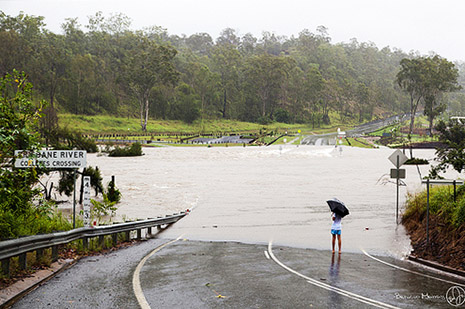THE two-hour drive from Toowoomba to Brisbane goes through some of the areas most drastically affected by the 2011 floods, so when severe weather warnings came through on the morning of Saturday 26th we cancelled our day trip, thinking we’d go to the cinema instead. Mid afternoon, with the fog thickening, the wind whipping up and the dog getting nervous, we cancelled that trip as well.
We were not among those directly affected by the cyclonic chaos of the past few days, but the experience of being grounded is itself worth some consideration. Extreme weather events literally stop us in our tracks. Flights are cancelled, railway lines submerged, highways impassable. As creatures of a global economy, we have become a hyper-mobile species, but suddenly we find our movements radically curtailed.
Now, several days after the worst of the storm has passed through Queensland, trucks are backed up on major roads around the state. Kevin Barnes, a driver from Goondiwindi stranded in a convoy on the Warrego Highway, offered a stark summary on ABC News 24: “When the trucks stop, Australia stops.” After only a few days without deliveries, the fresh food sections of the supermarket are almost empty. Mining companies can’t get coal stocks moving; everyone’s running low on fuel.
If, as the New Scientist proclaims in a recent article, extreme weather is the new norm, we will have to rethink our dependencies on long-distance supply lines and start to focus on rebuilding local economies. This goes right against the grain of economic thinking in Australia, but here we are woefully out of touch. A trend towards localism is well established in Britain, where the Localism Act came into effect a year ago, and in the United States.
According to Tim Lang, professor of Food Policy at the City University of London, localism is having an unprecedented effect on what people eat and how they shop for food. Farmers markets are on the increase, and in London suburbs you can shop for local produce from carts parked on street corners.
Localism also means a shift in the focus of planning and decision-making so that councils and communities play a greater role, but this is no simple process of reversion. Sophisticated policy at a national level is required to make local governance work in a complex democracy, and the process of achieving consensus among disparate community bodies can be a formidable challenge.
There are crucial advantages, though, when it comes to a communal emergency caused by weather conditions. People can depend on local resources and infrastructure; nearby producers are better able to keep up the supply of fresh food; action plans can be fast-tracked through well-established networks. And when it comes to preparation and recovery, well-organised communities are more effective in lobbying for the resources they need from state or federal governments.
Flood management is a major issue in Britain, and in 2002 a National Flood Forum was established to provide strategic support to flood-affected communities. The NFF is a registered national charity, dedicated to “campaigning on behalf of flood risk communities and working with government and agencies to ensure that they develop a community perspective.” One of the ways it does this is through a roadshow that visits towns and neighbourhoods around the country, with an open invitation to residents to come and talk about their experience and contribute views.
This is in striking contrast to the terms on which our own National Flood Forum was set up when it met, in Brisbane in October 2011, as a convention of “emergency management authorities and peak emergency services organisations.” Attorney-general Robert McClelland delivered an opening address stressing that is was “critical the community learns from its responses to natural disasters” and that the role of the invited experts was to help prepare them. None of the learning, it seems, was to work the other way.
This one-way approach to communications fails to address the situations in which flood-affected communities actually find themselves. One of the ironies of the Brisbane meeting was that much time was spent on the problem of how to issue warnings. Lives were lost in Grantham in January 2011 partly because the residents had no warning, so delegates at the forum emphasised the need for a system of personal text messaging to alert those in areas at risk. But in 2013 the storm took out one of the Telstra transmitters and its back-up transmitter.
Electronic communications can never be entirely reliable in extreme weather conditions. When residents of North Bundaberg were stranded in perilous conditions, the premier, Campbell Newman, resorted to urging all those remaining to check on their neighbours and inform the emergency services of anyone who might be missed in the rescue operation. A council doorknock campaign was required in Logan, where flooding reached levels no one had predicted.
Circumstances like these test the qualities of neighbourhood. But local knowledge can be a vital factor, and this is where Australian approaches to flood prevention and management differ significantly from those being taken in Britain. While the localism movement focuses on specific mechanisms for devolving governance, it also expresses an underlying culture change based on a revaluation of local knowledge. Those whose relationship with the place where they live goes back several generations, those who work on the land, and those whose work connects them with the people of the neighbourhood have forms of intelligence that no outsider can replicate.
This is a counterbalance to media images of disaster-affected communities as victims, heroes and helpers. Gratifying as it may be to applaud the spontaneous uprising of a mud army ready to take on the massive clean-up in the aftermath of a flood, the work involved in preparing a defence against the next onslaught is just as important, and fraught with less tangible forms of difficulty.
Flood levees, for example, are expensive, and can usually only be funded if there are contributions from state and federal governments to supplement whatever councils are able to invest. They are also controversial. Not all residents will agree on the need for or the effectiveness of constructions that may be obtrusive and unsightly, but negotiations take place under pressure from insurance companies.
Suncorp has refused to sell new policies in Roma until a levee is built, and similar situations are replicated around the state. Nearly 40 per cent of Queenslanders are without insurance against flooding, and those who do have policies are facing steep hikes in their premiums. The consumer organisation CHOICE recently voiced concern that repeated flooding in some towns is creating an insurance underclass.
Rob Whelan, the chief executive of the Insurance Council of Australia, was challenged in a recent ABC Lateline interview about insurers’ refusing cover for residents in parts of Roma, Ipswich and Gympie. He responded with a sweeping statement. “The risk there,” he said, “was about the insurer identifying that there was this constant inflow of floods into these particular communities and those communities, local councils, etc, were doing nothing about mitigating that risk.”
This prompted an outburst of frustration from the mayor of Ipswich. “It’s just typical, it’s absolutely typical,” said Paul Pisasale. “What he’s trying to do is the old trick of shift the blame – let’s start hitting and blaming local governments… He must be living in 1893, because since then local governments have got the most stringent council planning requirements. We’ve spent millions and millions and millions of dollars on flood mitigation and all councils are struggling.”
IN BRITAIN, the National Flood Forum works to facilitate communications between insurers and flood-affected communities, with an emphasis on two-way communication. The summit approach taken by our own National Flood Forum in Brisbane served instead to reinforce a top-down model, in which communities receive advice from experts and industry leaders, and disregard it at their peril.
Countering this approach takes time and persistence, and university researchers in Britain are focusing on the underlying culture changes associated with effective flood-mitigation programs. One of the most influential studies, the Knowledge Controversies Project, was conducted by academics from the universities of Oxford, Durham and East Anglia, who set up a research partnership with community volunteers in the towns of Ryedale and Pickering in North Yorkshire.
The work occurred over three years, between 2007 and 2010, and highlighted the controversies that typically arise over local flood mitigation plans. By seeing these as “controversies of knowledge,” the researchers sought to break down simplistic dichotomies and stereotyped notions of “resistance.” When the research teams began to explore the different positions taken on such matters as the construction of levees and the creation of flood plains, they discovered that the blocks to consensus sometimes came not from stubborn opinions and ignorance of the facts, but rather from differing kinds of experience, which in turn gave rise to different models of local knowledge.
An exhibition held at Ryedale in 2010 provided an overview of the project, and issued some key challenges: Whose knowledge is admissible? Can we create a convergence of scientific and community knowledge about flood risk and management in particular localities? How and why does flood modelling become subject to controversy?
An obvious response to this last question is that flood modelling is bound up with the controversy about climate change. The exhibition included a poster providing detailed timelines of flood patterns in the region, drawing together records from oral histories, press archives, farmers’ log books and family letters. Gaps in the data were identified and inconsistencies scrutinised. The resulting storyboard presents a picture of the deep history that underlies local knowledges, and offers valuable insight into the underpinnings of what has become crudely characterised as a “debate.”
Since moving to Toowoomba five years ago, I have made the transition from a university-oriented social world in which climate change was almost unanimously embraced as the new reality, to a neighbourhood where most of the residents are engaged in some form of farming or agribusiness. Almost no one I talk to around here is inclined to interpret weather patterns in accordance with a climate change perspective. They don’t seek to argue about it, but will quietly offer some comment about how they have records going back in the family for sixty years, or give an example of where and when they’ve seen it like this or worse. And I don’t seek to argue with them, because they know things I don’t, and in ways that I don’t.
Yes, I see things differently, but why and how does that matter? I know for sure that if it comes to it, and we are cut off by some major weather event, we will be working in concert. There will be vegetables in the common patch of land at the back, and a couple of sturdy utes at the ready, to drive through any mud and debris accumulated after a maelstrom like the one that came through last weekend. •




